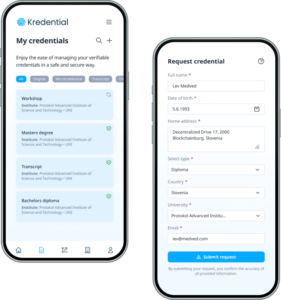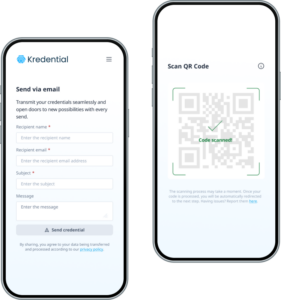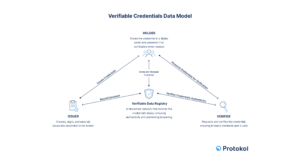As digital interactions become increasingly integral to our lives, ensuring the authenticity and security of information is more critical than ever. Blockchain verifiable credentials (VCs) address these concerns by offering a secure, efficient, and privacy-respecting method for certifying and verifying information. This article explores the concept of verifiable credentials, their benefits, the underlying technology, and their various use cases.
What Are Verifiable Credentials?
VCs are tamper-proof digital statements made by an issuer about a subject (such as an individual or organisation). These credentials can be used to represent information such as educational qualifications, professional certifications, identity documents, and more. The primary purpose of blockchain verifiable credentials is to provide a trustworthy and verifiable method of sharing information, ensuring its authenticity, accuracy and reliability.
How do Verifiable Credentials work?
Imagine Lev, a recent graduate from XYZ University, who needs to prove his academic credentials to potential employers. Here’s how verifiable credentials streamline this process:
Issuer: XYZ University
XYZ University creates a digital credential for Lev’s degree, detailing his name, the degree awarded, the graduation date, and the university’s digital signature. This credential is securely stored on the blockchain, ensuring its authenticity and immutability.
Holder: Lev
Lev receives this digital credential in his digital wallet, a secure application on his smartphone or computer where he manages and stores his credentials. Now, he can present his degree to potential employers or other verifiers.

When Lev applies for a job at ABC Company, he shares his verifiable credential from his digital wallet. The hiring manager at ABC Company verifies the credential using a tool that checks the blockchain to confirm it was issued by XYZ University and hasn’t been tampered with.

Credential Issuance: XYZ University issues a digital degree to Lev and stores it on the blockchain.
Credential Storage: Lev stores the credential in his digital wallet.
Credential Verification: ABC Company verifies the credential’s authenticity by checking the blockchain.

This process is secure, efficient, and reliable, ensuring Lev’s qualifications are quickly and accurately verified, enhancing trust and reducing the potential for fraud.
Technology Behind Verifiable Credentials
Verifiable Credentials Blockchain Integration
Blockchain technology, Decentralized Identifiers (DIDs), and Zero-Knowledge Proofs (ZKPs) interact to form a secure and trustworthy ecosystem for managing and verifying credentials. These components work together to ensure the integrity, privacy, and efficiency of verifiable credentials, allowing for tamper-proof issuance, storage, and verification of information.
Blockchain technology underpins verifiable credentials by providing a decentralized and immutable ledger that records the issuance and status of credentials, ensuring they remain secure and verifiable over time. The decentralized nature of blockchain means there is no single point of failure, enhancing the security and resilience of the credentialing system.
Micro-Credentials
Implementing blockchain-based micro-credential systems reduces administrative burdens and costs while ensuring the verifiability of various types of achievements and qualifications. These credentials are particularly beneficial in executive education and professional development but extend far beyond these sectors. For example, micro-credentials can be issued for specific skills acquired in the workplace, certifications for compliance in regulated industries, or even recognition of completed training in areas such as cybersecurity or environmental standards. This flexibility allows organizations across industries to securely verify competencies, streamline onboarding processes, and ensure compliance with sector-specific regulations.
Decentralised Identifiers (DIDs)
Decentralised Identifiers (DIDs) are a core component of the infrastructure supporting blockchain verifiable credentials. DIDs are unique identifiers that are created, owned, and controlled by individuals or entities without needing a central registry. They enable secure and privacy-preserving interactions between the issuer, holder, and verifier. DIDs use public key cryptography to ensure that only the rightful owner can control their identifier, providing a robust foundation for trust.
Zero-Knowledge Proofs
Zero-knowledge proofs (ZKPs) are cryptographic methods that allow one party to prove to another that a statement is true without revealing any additional information. In the context of blockchain verifiable credentials, ZKPs enable holders to prove certain aspects of their credentials (such as age or membership status) without disclosing the entire credential. This enhances privacy and security, as only the minimum necessary information is shared.
W3C Standards
The World Wide Web Consortium (W3C) has established standards for verifiable credentials to ensure interoperability and consistency across different systems. These standards define the data model for blockchain verifiable credentials, specifying how credentials should be structured and exchanged. Adhering to W3C standards ensures that VCs can be used and verified across various platforms and services, promoting wider adoption and usability.
Interoperability Challenges and Solutions for Verifiable Credentials
One of the major challenges in adopting verifiable credentials at scale is ensuring that credentials issued in one system are recognized and verifiable across different platforms, industries, and jurisdictions. This issue is known as interoperability, and solving it is crucial for the widespread adoption of VCs.
W3C’s Decentralized Identifier (DID) standards play an essential role in addressing this issue by providing a common framework for creating, using, and verifying credentials across multiple ecosystems. However, this framework alone is not enough to guarantee seamless interaction between different systems. To address these challenges, solutions like credential bridges and cross-chain verification mechanisms are being developed.
- Credential Bridges: Credential bridges enable the seamless conversion and recognition of blockchain verifiable credentials across different platforms. For example, a credential issued on a European academic blockchain can be verified by a North American system, ensuring cross-border recognition and interoperability.
- Cross-Chain Verification: Since multiple blockchains support verifiable credentials, cross-chain verification mechanisms allow VCs issued on one blockchain to be verified on another, enhancing their flexibility and usability.

Real-World Adoption and Case Studies
As the technology matures, several organizations and governments are exploring real-world applications of verifiable credentials. Some notable examples include:
- EBSI VECTOR: The European Union established the European Blockchain Services Infrastructure (EBSI) to develop a comprehensive blockchain framework supporting various applications, such as verifiable credentials, digital identity, notarization, and data sharing. EBSI VECTOR, a specific initiative within this framework, focuses on leveraging verifiable credentials for secure digital interactions. It facilitates the issuance and verification of digital credentials across sectors like education, employment, and social security, showcasing blockchain’s potential to create a trusted, interoperable digital ecosystem for cross-border collaboration.
Protokol plays a key role in the EBSI VECTOR project by applying its expertise in blockchain verifiable credentials to develop a secure and user-friendly solution for the EBSI VECTOR pilot. This collaboration highlights the use of VCs in streamlining the verification of educational and professional qualifications across Europe, making credentialing more trustworthy and efficient.
Kredential by Protokol, while central to the education component of the project, is not limited to this use case. It is a full-scale verifiable credential solution that supports a wide range of applications, such as employment verification, healthcare, and KYC processes, by providing a flexible and secure framework for managing and verifying digital credentials. This capability enhances data integrity, compliance, and interoperability across sectors, showcasing the broader potential of blockchain technology in creating a standardized digital ecosystem for cross-border interactions throughout Europe. You can learn more about Kredential as a verifiable credentials solution here.
- ID2020 and Digital Identity in Developing Countries: ID2020 is a global initiative that leverages blockchain verifiable credentials to provide legal identities to populations that lack formal identification. These systems empower individuals in developing countries by granting access to essential services like banking, healthcare, and education.
Benefits of Verifiable Credentials
Verifiable credentials (VCs) have emerged as a crucial technology in the digital age, offering significant advantages in terms of security, privacy, and efficiency. The data and trends supporting their adoption highlight their transformative potential across various sectors.
Security and Fraud Reduction
Traditional methods of credential verification are susceptible to fraud and tampering. For instance, the International Chamber of Commerce predicts that the global trade in counterfeit and pirated goods could reach $4.2 trillion by 2022. This figure underscores the pervasive issue of fraud, which VCs can help mitigate. By utilising blockchain technology, VCs ensure that credentials are tamper-proof and can be easily verified. Blockchain’s immutability means that once a credential is issued, it cannot be altered, preserving the integrity of the information.
Privacy and Data Control
Privacy concerns are at an all-time high, with consumers increasingly wary of how their personal data is used and shared. According to a study by the Pew Research Center, 79% of Americans are concerned about how companies use their data. Verifiable credentials empower individuals by giving them control over their personal information, allowing them to selectively disclose specific attributes without exposing their entire data set. This selective disclosure aligns with data protection regulations like GDPR, enhancing user trust and compliance.
Efficiency and Cost Savings
The manual verification of credentials is not only time-consuming but also costly. A verifiable credentials example can be extrapolated from the fact that The Society for Human Resource Management (SHRM) reports that the average cost per hire in the United States is around $4,129, with a significant portion attributed to background checks and verification processes. By automating these processes, blockchain verifiable credentials can drastically reduce both time and costs. Digital verification is almost instantaneous, allowing organisations to streamline operations and allocate resources more effectively.
The data clearly indicates that verifiable credentials are not just a technological innovation but a necessity in today’s digital world. They offer substantial benefits in terms of security, privacy, and efficiency across various sectors. As we continue to move towards a more digital and interconnected world, the adoption of blockchain verifiable credentials will be crucial in ensuring trust and reliability in digital interactions.
Verifiable Credential Use Cases
Verifiable credentials have diverse applications across various sectors, demonstrating their versatility and potential to enhance trust and security in digital interactions. Some of the most popular use cases for verifiable credentials include:
1. Educational and Professional Credentials
A Key Use Case for Blockchain Verifiable Credentials
One of the most significant applications of blockchain verifiable credentials is educational and professional qualifications. Verifiable credentials offer a secure and efficient way to issue, store, and verify academic degrees, certifications, and professional licenses. This ensures that individuals can easily prove their qualifications to potential employers, educational institutions, or other verifiers, without the risk of fraud or lengthy manual processes.
For example, instead of relying on paper certificates or third-party verification services, universities and professional bodies can issue blockchain-based digital credentials that are tamper-proof and instantly verifiable. This simplifies the process for both credential holders and verifiers, providing a trustworthy and efficient method for credentialing.
2. Social Security
Blockchain verifiable credentials can significantly enhance the security and efficiency of social security systems. Governments can issue VCs for social security benefits, ensuring accurate distribution and reducing the risk of fraud. By issuing digital credentials for eligibility, benefits, and identity verification, this method streamlines the verification process, making it more secure and accessible.
For example, imagine a government issues a blockchain verifiable credential to eligible citizens for unemployment benefits. Each citizen receives a tamper-proof digital credential stored in their secure digital wallet, which they can present when applying for or claiming benefits. Social services can instantly verify the individual’s eligibility by checking the blockchain, ensuring that the information is accurate and hasn’t been altered. This not only reduces processing times but also mitigates fraud risks, such as duplicate claims or unauthorized access to benefits.
This automated, secure system simplifies interactions for both citizens and government agencies, reducing paperwork and manual verification processes, while ensuring only those who qualify receive assistance. Additionally, blockchain’s immutability ensures that once a credential is issued, it cannot be tampered with, providing long-term trust and security.
3. Health Records
In healthcare, blockchain verifiable credentials can secure patient records and improve data interoperability between providers. Nearly 80% of healthcare providers report challenges in exchanging patient health records, according to the Office of the National Coordinator for Health Information Technology (ONC). Blockchain verifiable credentials address these challenges by providing a secure and standardised method for sharing patient information, enhancing privacy and efficiency. For instance, a patient could present a blockchain verifiable credential to a new healthcare provider, ensuring that their medical history is accurately and securely transferred.
4. Legal Identity
Blockchain verifiable credentials simplify the process of identity verification for various services, from banking to online services. By issuing VCs for legal identities, governments and organisations can provide a secure and convenient way for individuals to prove their identity, reducing the risk of identity theft and fraud. This application is particularly valuable in scenarios where quick and reliable identity verification is critical.
5. Travel & Hospitality
The travel and hospitality industry can benefit from blockchain verifiable credentials by streamlining check-ins and border control processes. VCs for travel documents and hotel bookings allow travelers to move through security checks more efficiently, reducing wait times and improving the overall travel experience. For example, a blockchain verifiable credential could be used to verify a traveler’s identity and flight details, speeding up the check-in process.
6. Membership Verification
Organisations can use blockchain verifiable credentials to verify memberships, ensuring that only authorised individuals have access to specific services or benefits. This is useful for clubs, organsations, and subscription-based services. For example, a gym could issue a VC to its members, which can be verified at entry points to grant access.
7. Age Verification
VCs offer a secure and privacy-respecting way to verify age for age-restricted services, such as purchasing alcohol or accessing certain online content. This ensures compliance with legal requirements while protecting user privacy. For instance, an online service could verify a user’s age using a blockchain verifiable credential without needing to access other personal information.
Emerging Applications of Verifiable Credentials
1. Metaverse Integration
In virtual platforms like Decentraland, blockchain verifiable credentials are used to manage user identities and control access to specific areas and functions. VCs enable a decentralized, cryptographic verification process that ensures only authorized avatars can perform designated actions or enter restricted zones. By integrating blockchain verifiable credentials, platforms can enforce permission-based access without relying on centralized authorities, enhancing the security of role attribution and access control.
2. Scientific Data Access
In scientific research, blockchain verifiable credentials are applied to control access to sensitive datasets. Smart contracts, operating on blockchain networks, ensure that only authorized individuals with valid credentials can access specific data. This system enhances data privacy and security, making it possible to share sensitive research information securely. The use of VCs also ensures compliance with data protection regulations, such as GDPR, by providing a verifiable, privacy-preserving authentication mechanism.
3. Pharmaceutical Supply Chain
In the pharmaceutical industry, blockchain verifiable credentials are used to authenticate the origin and movement of drugs throughout the supply chain. These credentials verify the identities of trading partners and ensure that each package of drugs is legitimate. When combined with Digital Product Passports (DPPs), VCs can provide even more detailed and verifiable information about each drug, including its composition, manufacturing processes, and storage conditions. Blockchain-based credentials, compliant with frameworks like the Drug Supply Chain Security Act (DSCSA), are used to track and verify the movement of drugs from manufacturer to consumer, reducing the risk of counterfeit drugs and improving patient safety.
With a Digital Product Passport, every drug package is assigned a digital record, accessible through a blockchain verifiable credential, that not only confirms its authenticity but also provides transparent and real-time data on the product’s lifecycle. This combined approach enhances traceability, ensures compliance, and significantly boosts the reliability and safety of pharmaceutical products, from production to patient
4. Food Supply Chain
Verifiable credentials, combined with Decentralized Identifiers (DIDs), are implemented in food supply chains to improve traceability and verify the authenticity of products. Systems like AgriFoodCredChain use blockchain verifiable credentials to cryptographically secure information about the origin, handling, and quality of food products. This ensures that each stakeholder in the supply chain can verify the integrity of the data without reliance on centralized systems, reducing the risk of fraud and contamination.
Empowering Trust and Efficiency with Blockchain Verifiable Credentials
As digital processes continue to shape the future of industries, the need for secure, efficient, and trustworthy verification methods becomes paramount. Blockchain verifiable credentials provide a solution to this need, offering organizations a powerful tool to streamline verification processes, reduce fraud, and enhance privacy. Across sectors like education, social security, and supply chain management, VCs can deliver the trust and transparency required in today’s digital age.
With Kredential, we’ve already introduced a streamlined, blockchain-based platform that allows institutions and individuals to issue, store, and verify credentials securely and efficiently. Whether you’re looking to implement blockchain verifiable credentials for educational qualifications, professional certifications, or other credentials, Protokol is ready to support your journey.
Contact us today for a demo of Kredential or to learn how blockchain verifiable credentials can enhance trust, security, and efficiency within your organization.




